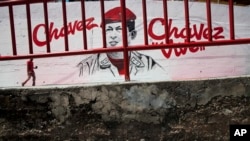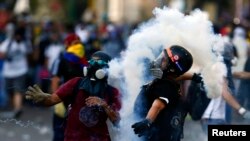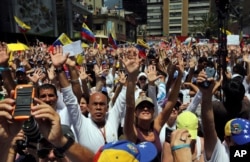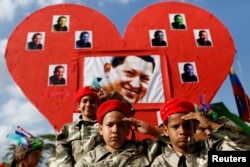CARACAS —
Venezuela geared up on Tuesday for commemorations of socialist leader Hugo Chavez's death despite continued protests against his successor that have shaken the OPEC member and threatened the legacy of “El Comandante.”
Even as students maintained barricades in some cities and activists held new rallies, President Nicolas Maduro's government was making lavish plans to honor Chavez on Wednesday's anniversary of his death from cancer.
Maduro, who announced Chavez's death in tears to a shell-shocked nation on March 5 last year, has made preserving Chavez's controversial legacy the guiding force of his presidency despite opposition from about half of Venezuelans.
The president is to preside over a military parade in Caracas on Wednesday, followed by a ceremony at the mausoleum housing Chavez's remains on a hilltop shantytown.
Latin American allies, including Bolivian leader Evo Morales and Nicaraguan counterpart Daniel Ortega, are expected to attend.
Maduro, 51, narrowly won election in April 2013 to replace his late mentor but has seen economic problems worsen, made little headway against violent crime, and faced street protests since early February in the nation of 29 million people.
Those demonstrations have brought Venezuela's worst unrest in a decade, with 18 people killed as demonstrators have faced off with security forces and Maduro supporters.
Yet there seems to be little chance of a Ukraine-style change at the top, given numbers on the street are not massive, the military appears to remain behind Maduro, and opposition leaders are not winning over 'Chavistas' in poor areas.
The current crisis has, though, exposed genuine discontent among Venezuelans on all sides, with the highest inflation in the Americas, shortages of products from toilet paper to milk, and violent crime rates among the worst in the world.
“Better Off With Chavez”
“We were better off with Chavez. Maduro has to work harder because if not, the people who elected him will be the people who end up getting rid of him,” Evelyn Vegas, 53, a housewife, said in a state-run supermarket.
That comment echoed a common sentiment among 'Chavistas', who remain loyal to Maduro since that was Chavez's dying wish, but are far from thrilled with his government.
Critics say it is irrelevant to be remembering Chavez and spending money on a military parade when Venezuela has so many pressing problems to resolve.
Students continued to block some streets in Caracas and other cities, most notably San Cristobal in western Tachira state, on Tuesday in what has become their modus operandi for permanent demonstration, despite annoying many residents.
In what has become a pre-dusk ritual in Caracas, several hundred militant protesters battled with police near Plaza Altamira in an affluent eastern district.
Hardened by several weeks of such clashes, the students carried better-quality gas masks, flung stones, prepared gasoline bombs and strung wires across the main avenue to block police motorbikes. Officers replied with teargas.
“They're celebrating the anniversary of a tyrant. We have to resist!” said Aquiles Aldazo, 18, spraying the word “Resistance” on a wall.
Earlier, thousands had rallied peacefully in two demonstrations.
“Heir to Chavez”
Protesters wore white and waved Venezuelan flags, chanting, “We don't want a dicatorship like Cuba!” or “We are all Leopoldo!” in reference to jailed protest leader Leopoldo Lopez.
Many Venezuelans were on the road on Tuesday, returning from beaches after a long weekend for Carnival that took some of the heat out of the protests and clashes of recent weeks.
Venezuela's troubles have caught international attention, with calls for dialogue from the Vatican to the White House. Various celebrities have weighed in too, mostly to criticize Maduro, with a mention even occurring at the Oscars.
Foreign Minister Elias Jaua, who met with U.N. Secretary-General Ban Ki-moon in Geneva on Monday, said Venezuela was the victim of an international campaign to ignore social gains under Chavez and Maduro and paint the government as a dictatorship.
“It's a well-designed campaign,” he told reporters in Geneva on Tuesday, saying barely 1 percent of Venezuela had been affected by protests.
“They're using, as spokespeople, world-famous artists who barely know where Venezuela is, let alone the reality of our country, and our democratic political process.”
Chavez enjoyed high popularity throughout his 14-year rule, winning a dozen national elections thanks to his charisma, humble roots that appealed to the poor, and liberal use of the OPEC nation's oil revenues to finance slum welfare programs.
“The recent problems have not gone on long enough for most people to give up on a government that has raised their living standards more than any other government in decades,” wrote Mark Weisbrot, a U.S. analyst generally favorable to the government.
Though they recognize some social gains, opponents say Chavez's legacy is a shameful one.
He bullied opponents - some of whom were jailed or went into exile - and ruined Venezuela's economy by squandering an oil revenue boom, crushing the private sector, and sticking stubbornly to failed statist policies, they say.
“Maduro tries to sell himself as the heir to Chavez, but he is just a bad copy,” opposition leader Henrique Capriles said in an interview. “What we see now are the desperate kicks of the drowning man, who's trying to appeal constantly to sentiment over Chavez to justify the failure of his own government.”
Even as students maintained barricades in some cities and activists held new rallies, President Nicolas Maduro's government was making lavish plans to honor Chavez on Wednesday's anniversary of his death from cancer.
Maduro, who announced Chavez's death in tears to a shell-shocked nation on March 5 last year, has made preserving Chavez's controversial legacy the guiding force of his presidency despite opposition from about half of Venezuelans.
The president is to preside over a military parade in Caracas on Wednesday, followed by a ceremony at the mausoleum housing Chavez's remains on a hilltop shantytown.
Latin American allies, including Bolivian leader Evo Morales and Nicaraguan counterpart Daniel Ortega, are expected to attend.
Maduro, 51, narrowly won election in April 2013 to replace his late mentor but has seen economic problems worsen, made little headway against violent crime, and faced street protests since early February in the nation of 29 million people.
Those demonstrations have brought Venezuela's worst unrest in a decade, with 18 people killed as demonstrators have faced off with security forces and Maduro supporters.
Yet there seems to be little chance of a Ukraine-style change at the top, given numbers on the street are not massive, the military appears to remain behind Maduro, and opposition leaders are not winning over 'Chavistas' in poor areas.
The current crisis has, though, exposed genuine discontent among Venezuelans on all sides, with the highest inflation in the Americas, shortages of products from toilet paper to milk, and violent crime rates among the worst in the world.
“Better Off With Chavez”
“We were better off with Chavez. Maduro has to work harder because if not, the people who elected him will be the people who end up getting rid of him,” Evelyn Vegas, 53, a housewife, said in a state-run supermarket.
That comment echoed a common sentiment among 'Chavistas', who remain loyal to Maduro since that was Chavez's dying wish, but are far from thrilled with his government.
Critics say it is irrelevant to be remembering Chavez and spending money on a military parade when Venezuela has so many pressing problems to resolve.
Students continued to block some streets in Caracas and other cities, most notably San Cristobal in western Tachira state, on Tuesday in what has become their modus operandi for permanent demonstration, despite annoying many residents.
In what has become a pre-dusk ritual in Caracas, several hundred militant protesters battled with police near Plaza Altamira in an affluent eastern district.
Hardened by several weeks of such clashes, the students carried better-quality gas masks, flung stones, prepared gasoline bombs and strung wires across the main avenue to block police motorbikes. Officers replied with teargas.
“They're celebrating the anniversary of a tyrant. We have to resist!” said Aquiles Aldazo, 18, spraying the word “Resistance” on a wall.
Earlier, thousands had rallied peacefully in two demonstrations.
“Heir to Chavez”
Protesters wore white and waved Venezuelan flags, chanting, “We don't want a dicatorship like Cuba!” or “We are all Leopoldo!” in reference to jailed protest leader Leopoldo Lopez.
Many Venezuelans were on the road on Tuesday, returning from beaches after a long weekend for Carnival that took some of the heat out of the protests and clashes of recent weeks.
Venezuela's troubles have caught international attention, with calls for dialogue from the Vatican to the White House. Various celebrities have weighed in too, mostly to criticize Maduro, with a mention even occurring at the Oscars.
Foreign Minister Elias Jaua, who met with U.N. Secretary-General Ban Ki-moon in Geneva on Monday, said Venezuela was the victim of an international campaign to ignore social gains under Chavez and Maduro and paint the government as a dictatorship.
“It's a well-designed campaign,” he told reporters in Geneva on Tuesday, saying barely 1 percent of Venezuela had been affected by protests.
“They're using, as spokespeople, world-famous artists who barely know where Venezuela is, let alone the reality of our country, and our democratic political process.”
Chavez enjoyed high popularity throughout his 14-year rule, winning a dozen national elections thanks to his charisma, humble roots that appealed to the poor, and liberal use of the OPEC nation's oil revenues to finance slum welfare programs.
“The recent problems have not gone on long enough for most people to give up on a government that has raised their living standards more than any other government in decades,” wrote Mark Weisbrot, a U.S. analyst generally favorable to the government.
Though they recognize some social gains, opponents say Chavez's legacy is a shameful one.
He bullied opponents - some of whom were jailed or went into exile - and ruined Venezuela's economy by squandering an oil revenue boom, crushing the private sector, and sticking stubbornly to failed statist policies, they say.
“Maduro tries to sell himself as the heir to Chavez, but he is just a bad copy,” opposition leader Henrique Capriles said in an interview. “What we see now are the desperate kicks of the drowning man, who's trying to appeal constantly to sentiment over Chavez to justify the failure of his own government.”








